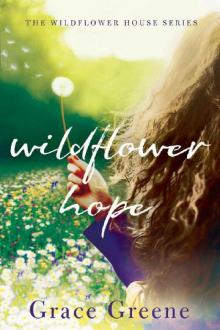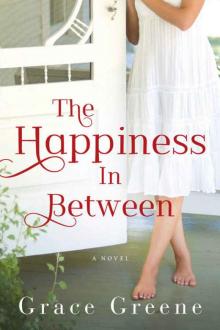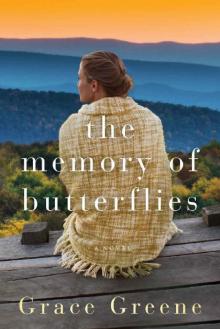- Home
- Grace Greene
The Happiness in Between Page 6
The Happiness in Between Read online
Page 6
Her aunt smiled, and her eyes brightened. “You have a kind heart despite what you’ve been through. You always were such a sweet child.”
A sweet child. Those words echoed in Sandra’s head as she parked and retrieved the suitcase from the backseat. They walked through the parking deck and the elevators to cross over to the terminal, Sandra pulling the suitcase and Aunt Barbara holding her niece’s arm. The physical contact seemed familiar somehow. Maybe she remembered more of those early days out at the homeplace than she’d realized.
Barbara said, “I’ve left cash for you in an envelope in the bookcase behind the Treasury of Knitting.”
“For me?”
“For emergencies or whatever. The bills should be taken care of already, but one never knows. Anything can happen in a couple of months.” Her aunt’s words flowed without pause. “I left groceries, and you’ll find meals in the freezer. The post office is supposed to be holding the mail, but if you will, please check the mailbox anyway, once a week or so, just in case.” She pointed her finger as if the mailbox, or maybe the house, were right in front of them. “You should take my room. It’s the best mattress and the coziest room, but make yourself at home and choose whichever you want. And Honey . . . I know you’ve never met her, but she’s a sweetheart. A bit timid, but that’s from being in a shelter and who knows where else before that. She’s been with me for several years now, and her true personality has blossomed. Blossomed. A loving dog and smart as all get-out. I hate to leave her.” She stopped, choking up a bit. She pressed a finger to her eye, cleared her throat, and continued. “But she’s no youngster, and the heat, you know, in Florida . . . And how could she fly? The vet thinks she’s about ten. Not so old, but definitely not young, especially having had such a hard life.” Barbara smiled. “She’ll be fine in your care. Are you sure two months won’t be a problem?”
As her aunt had said, a lot could happen in a couple of months. For now, that sounded fine. Sandra nodded. “No problem.”
Reassured, Barbara looked out the window but was silent for only a moment. “This is a fine day. Should be good for flying, don’t you think? A nice day for Honey, too. I didn’t want to leave her cooped up, so she’s enjoying the garden. It’s fenced, you know.” She lowered her voice. “Soon after she came to live with me, she took off. Ran off into the woods. I couldn’t sleep for fear she’d end up on the state road . . . if you know what I mean.” Barbara gave a quick shudder. “She came back the next day, but I didn’t want to go through that again, so I had the fence put up.”
In the end, Sandra escorted her aunt to the ticketing counter and through the terminal to security, but from that point Barbara had to manage on her own. She patted Sandra’s arm. “I’m glad you’ll be taking care of my house. Honey will be in good hands with you.”
Sandra read doubt in her eyes regardless of the encouraging words. And no wonder. Aunt Barbara knew enough about Sandra’s past to have reason to doubt. But it didn’t matter. Sandra’s ears were ringing with the constant torrent of chatter. Keeping up a good front had exhausted her, but she’d gotten the job done, and her aunt would soon be on the way to Florida.
In the end, the most important lesson Sandra had learned over the last couple of years, and especially over the last month, was that life was mostly about survival. Anything else was a bonus. Trent hadn’t been wrong about everything.
The interstate was easy. Sandra had driven I-64 many times. Beyond Short Pump, the trees dominated both sides of the highway, concealing most of the rolling, wooded landscape. Sandra liked the quiet the country promised and the prospect of peace, too. The right kind of boredom. Though she hadn’t ventured out to Aunt Barbara’s house since before she left for college—it felt like a lifetime ago—she knew the way. She left the interstate at the Cross County Road exit and followed the state road until she reached the turnoff for Shoemaker Road on the right, but she started slowing down a lot sooner, warned first by an old blue house on the left that she’d totally forgotten about, and then the rows of old mailboxes in a wooden frame opposite the turnoff. When she turned onto Shoemaker Road, the asphalt ended.
She recalled the road being in better condition. She slowed way down to avoid the deeper ruts and tall clumps of weeds. An area of forest created a buffer between the state road and the creek. Beyond the trees, the road sloped down to meet the creek where it crossed via a wooden plank bridge. The bridge over Cub Creek was smaller than she remembered. The planks were gray and warped, and several were broken. She paused before driving over it. But it was the way in or out, so clearly the bridge was still usable. Had, in fact, been used that morning, she reassured herself.
Beyond Cub Creek, the land rose again. On the right, the land opened up. It had once been farmed. She remembered corn. But that was long ago. The woods, wild and unkempt, continued along the left-hand side and came right up close to the drainage ditch.
Her tires were new. She’d spent a nice bit of change on them, and she didn’t want to risk wrecking them or the car’s undercarriage, so she took her time maneuvering the ruts and wallows and weeds. In a clearing on the left, she passed the broken-down one-room schoolhouse and, suddenly flooded with memories, she was tempted to pause, but she’d save reminiscing for later. She was going to be hanging out at Aunt Barbara’s house for a while. For now, she had a date with a dog and needed a bathroom.
Despite herself, she paused to acknowledge her memories of this place. They’d come out here often when she was a child. A kid’s memory was different. Size-wise and shiny-wise, too. The adult brain provided a different experience. But if her aunt’s house wasn’t quite as her child’s memory billed it, it was a roof over her head and private. Other than a pillow and bed, and the opportunity to rest, alone and not looking over her shoulder, Sandra didn’t need much. As for the dog . . . she wasn’t a fan, but how much trouble could one old dog be?
The dirt road ended in front of the house, with the house on her left, facing the road and a long, fallow field on the opposite side. The house was large. Perhaps not as large as her child’s eyes remembered, but much larger than a cottage, as her aunt had called it. Mostly Sandra remembered the porch that spanned the front of the house. That had been her particular space when they visited. In recent years, Aunt Barbara had let vines run up the left side of the two-storied house. They were a riot of leaves, not all green. Lots of sticks and dead leaves were caught in there, and who knew how many insects were living in that greenery?
She felt twiggy legs creepy-crawling on her arms, her ankles, and up her back, and she tried to shake the sensation.
The wood siding was painted white. It was dirty, and the color was faded, but the structure looked sound. The blue shutters needed repair and painting. Several were missing slats, and some were slightly askew.
It was an old house, but if the doors locked and the plumbing worked, she’d be fine.
An old sedan was parked on the left side of the house. Her aunt hadn’t mentioned it, but it was surely hers. The woods came up close to the driveway, and a few branches, high above, arched over and reached toward the house. Sandra pulled up and parked behind the car. There was plenty of room.
The driveway had been graveled once upon a time, but what little gravel was left was embedded in the hard blue-gray dirt. There were a few rain puddles. It had been a rainy spring in Richmond, too, with more expected. But the air smelled fresh. She stopped, closed her eyes, and breathed in deeply.
Nothing hurt. Not her lungs. Not her head. Grateful, she touched her scalp and ruffled her hair. No itch.
Around her, the trees were leafing out. The new green leaves were bright.
Who cared about old shutters and dingy paint? It was the bones that mattered. Her mom or someone in her past had said something like that. It was funny to hear it, almost as if it were being whispered in her ear, while she stood there dreamy-eyed in the driveway puddles, staring at the house.
She opened the trunk and grabbed the small suitcase and the pl
astic laundry basket, and then carried them up to the porch.
A porch swing hung at one end and a wicker chair was at the other. Both needed cleaning. A blue bench was situated next to the door, and empty terra-cotta planters were shoved beneath it and stacked beside it. Metal chimes with blue ceramic insets hung from the porch roof near the steps. Sandra put her baggage on the bench and dug Aunt Barbara’s key from her jeans pocket.
Birds trilled nearby, loud in the silence. It struck her that there was no barking. But Honey was out back in the garden. Maybe sleeping. Sandra turned the key and had to give the knob and door a little extra shake before it opened.
The interior smelled old, and the light inside was dim. She stopped at the threshold. The curtains and shades were closed. She sneezed. Being in someone else’s house, without the person who owned it, felt like trespassing.
It didn’t matter. Sandra grabbed her basket with the purse on top and her other stuff on the bench, and then went back inside, pulling the door closed behind her and jiggling it to be sure it latched.
Still no barking. Honey must be napping, probably cozy in the sun. At least she wasn’t complaining.
Maybe it was because Barbara was old and lived alone in the middle of the woods, but she’d let the house get out of hand. Her aunt was obviously a hobby lover. From the porch to the living room and the foyer stairs, the entire area that she could see from this vantage point spoke of hobbies interrupted. She moved farther into the living room. On the floor beside a well-used stuffed chair, a half-knitted garment was wrapped around a thin skein. The needles were stuck into the midst, and it crowned a mound of countless other knitting projects piled on the floor. More projects filled the space between the chair and bookcase. Some of the yarn had spilled out onto the floor beyond the area of the piles. A tripping hazard. Stacks of magazines and pages torn from magazines occupied the coffee table. Sandra gave them a quick look. Recipes. Knitting patterns. There were more stacked in front of the windows.
She didn’t remember it looking like this. All she remembered was that the house had been stuffy and dark. She laughed softly. That much was still true. The foyer was dark, and the living room was in shadow, but other than the sense of intruding in someone else’s life, it wasn’t creepy. Or peaceful, either. It simply mirrored her mood—discouraged and used up. Adrift. How sad was it to think such thoughts of oneself at thirty?
Books were stacked in corners, and knickknacks were everywhere. There were no plates with half-eaten food, thank goodness, and generally, the place looked fairly clean, but it was oh-so-very dusty. No point in worrying over it. She could manage around the current state for the time she’d be here.
She needed a rest, maybe a hideout, too, and she’d found it here in the midst of someone else’s clutter. She wanted to feel grateful, but the goodwill she’d felt outside evaporated as her chest tightened.
Her lungs contracted, and her ribs hurt. She sat carefully, gingerly in the knitting chair and then leaned forward, dropping her face to her arms, breathing deeply. Long. Slow. In and out. It was a panic attack, nothing more. In and out. As her breathing eased, she sat upright and put her head back against the chair, waiting for the last of the tension to ease out of her chest.
She fell asleep, though not intentionally, and awoke with a jolt.
Honey.
How long had she slept? Minutes, that was all.
Still no barking. It struck her as very wrong. What kind of dog didn’t bark when their person came home? Barbara said Honey was old. Maybe Honey was deaf, too.
Sandra hurried into the dining room, to the French doors, but her aunt had stacked boxes and books against them, and the boxes had sagged against the drapes, creating a significant drag. The drapery rod looked very iffy. Sandra went to the kitchen and unlocked the door. It was stuck, but an extra yank got it open.
The kitchen extended beyond the rest of the house so that the door was in a side wall and the view from it was of the length of the back of the house. It opened directly into a disaster of a garden, where the fencing and the overgrown bushes and riotous weeds intermingled.
Was this where the dog was supposed to be hanging out? Poor Honey.
The fenced-in garden was as out of sorts as the house. Weeds and wild grasses had overtaken everything, had woven greedy strands up through the legs of the black metal patio table and chairs. The old-fashioned wire fence was attached to corner stakes that canted this way and that. The thick bushes did as much or more as the stakes to keep the wire in place.
Sandra stumbled over a rock on her way to reach the gate at the back. It was open. In fact, it looked like the gate had come unlatched when the fence had parted on the far side.
There was no dog anywhere in sight.
CHAPTER FOUR
“Honey?” She yelled louder. “Honey!”
Take care of my house. Take care of my dog. I trust you, Sandra, her aunt had said. And she heard her mom’s voice saying, And there’s an old dog. No trouble at all.
She ran out through the gate and across the yard calling for Aunt Barbara’s dog. There was a large, open grassy area beyond the fence and gate, and then the woods with two paths heading into the trees.
“Honey!”
Sandra stood there, hitting her fists against her thighs. What should she do? Call the police?
No. She crossed her arms and tried to calm down. She looked at the ground and thought it through. A dog had run off, and she would come back. Dogs did stuff like that. Hadn’t Barbara said Honey had done that before and returned the next day? Maybe she’d chased a rabbit or followed some interesting scents.
She surveyed the yard. The fire pit in the backyard wasn’t tall enough to hide more than a tiny puppy. Farther back, in the corner, was the old shed. Sandra walked around the shed, checking behind a board and other junk propped against the side and back. No dog.
At the edge of the woods, she hesitated. Was she going in there? Who was she kidding? She wasn’t a country girl. There were ticks and snakes in there. Mom had warned her many times about the dangers in the woods when telling her she must stay on the porch and in the yard.
The dog would come home when it got hungry.
Indecision nagged at her as she walked back to the house. She called one last time, “Honey?” and left the gate open.
Honey would be back. There was no point in phoning her aunt. In fact, Aunt Barbara’s plane was probably still in the air on its way to Florida. It would be wrong to worry her over nothing.
In the house, unable to relax, Sandra looked through the kitchen cupboards and the fridge. Milk. Eggs. Bread. Barbara had left the basics and more. Sandra peeked in the freezer. Frozen packages. Looked like meat loaf and a casserole. Maybe lasagna. Her aunt must have done a lot of cooking preparing for this visit. Sandra certainly wouldn’t starve, and she wouldn’t need to drive the many miles to a grocery store anytime soon.
She stood at the kitchen window hoping to see Honey, tail wagging and loping home. A watched pot never boils, right? That was something else her mother used to say. Sandra went back through the living room to the foyer, sneezing as she went. Dust and more dust.
Her belongings still sat at the foot of the stairs. She should carry them up and figure out which room, which bed, to use. Or maybe sort out the dirty clothes and carry them to the laundry room first. But it was hard to move on with the next logical tasks when the first, most important one was still hanging out there unresolved.
A noise. Through the front door, she heard it. Almost a brushing sound. A creaking board.
“Honey,” she whispered.
She fought the lock and the sticking latch in her haste to open the front door, but the reward was a dog lying there on the porch in a dwindling patch of sun. She had longish, silky black and white hair, with a touch of brown on one ear. Relief washed over Sandra.
True, she didn’t have much use for dogs, but the loss of this one would be a failure, her fault or not, and she didn’t want to start off that w
ay.
“Honey,” Sandra said, stepping carefully onto the porch, stooping, and holding out her hand.
The dog sniffed the offered hand and seemed content. She panted a bit and gave a short bark.
Huge relief. The dog was not only home, but she bore no resemblance to Leo whatsoever.
“I knew you’d return home.” Sandra stood and patted her thigh. “Come in, girl.”
Honey cocked her head, her brown eyes moist and curious, then stood and trotted inside, heading for the kitchen.
Sandra sighed in relief again. In validation. She’d done the right thing by not calling her aunt, and now Honey was home safe and sound.
She followed the dog into the kitchen and checked the bowls. There was water in one bowl, and Honey was lapping at it. Dry food, too. All was well. They were back on track.
Now she could carry her stuff upstairs with an easier conscience. That awful prospect of calling Aunt Barbara, of trying to explain the missing dog to her aunt and mother, was gone. Maybe that twinge of guilt, too, that her dislike of dogs had somehow caused the problem. Ridiculous, but that’s how it was. Now she was free to get on with things. She headed toward the stairs, tossing a stray skein of yarn into the corner pile as she passed Aunt Barbara’s knitting chair, hitting the top perfectly. “Score,” she said, and raised her fist in celebration.
Upstairs, Sandra stood in the doorway of her aunt’s bedroom. It was a study in chaos. The bed was hastily made. Clothes were draped over a chair and the foot of the bed. It was all far too personal and rather thoughtless, since Barbara had advised her niece to sleep in here. But that wasn’t the worst . . .
She walked forward, almost mesmerized, into her aunt’s bedroom.
The worst was the wall mural. Painted flora filled the wall in thick, childlike swathes of green and blue. Tropical plants. A palm tree? A view of sand and ocean? Greens and blues predominated with some brighter colors thrown in here and there. Brown was interspersed throughout and poorly done, lending a jarring note to the scene. Was that a conifer? So maybe not a tropical theme?

 Wildflower Hope (The Wildflower House)
Wildflower Hope (The Wildflower House) The Happiness in Between
The Happiness in Between The Memory of Butterflies: A Novel
The Memory of Butterflies: A Novel Clair (Beach Brides Book 4)
Clair (Beach Brides Book 4)